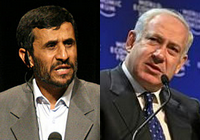JERUSALEM -- At about 5 p.m. on Jan. 14, a loud blast rang out along the Jordanian road that leads to the main bridge connecting the Hashemite kingdom with its neighbor, Israel. The target of the remote-controlled explosion was a two-car convoy carrying Israeli diplomats posted to Jordan, traveling back to Israel for the weekend. The assassination attempt failed, but it triggered a number of investigations as well as rampant speculation on both sides of the Jordanian-Israeli border. Differing theories point to various possible extremist perpetrators. The most intriguing reports, however, quote insiders in Jordan's security services who claim that the Islamic Republic of Iran ordered the assassination attempt on the Israeli diplomats.
The attack is a stark reminder that, while the international community ponders diplomatic formulas and economic sanctions as a way to stop Iran's nuclear program without going to war, Israel and Iran are already at war. For now, it is mostly a cold war -- with flashes of extreme heat.
Even if the investigation into the attack in Jordan ultimately clears Tehran, there is a reason why the names of Iran and Israel almost always come up whenever violence surfaces in the region. All the players in the Middle East know that Israel and the Islamic regime that rules Iran are sworn enemies. And they know that violence in the Middle East very often has connections to the conflict between those two countries. Israel's two most-recent wars were fought against militant organizations with close links to Iran. To some extent, the 2006 war against Hezbollah in Lebanon and the late-2008 war against Hamas in Gaza were proxy wars between Iran and Israel.

